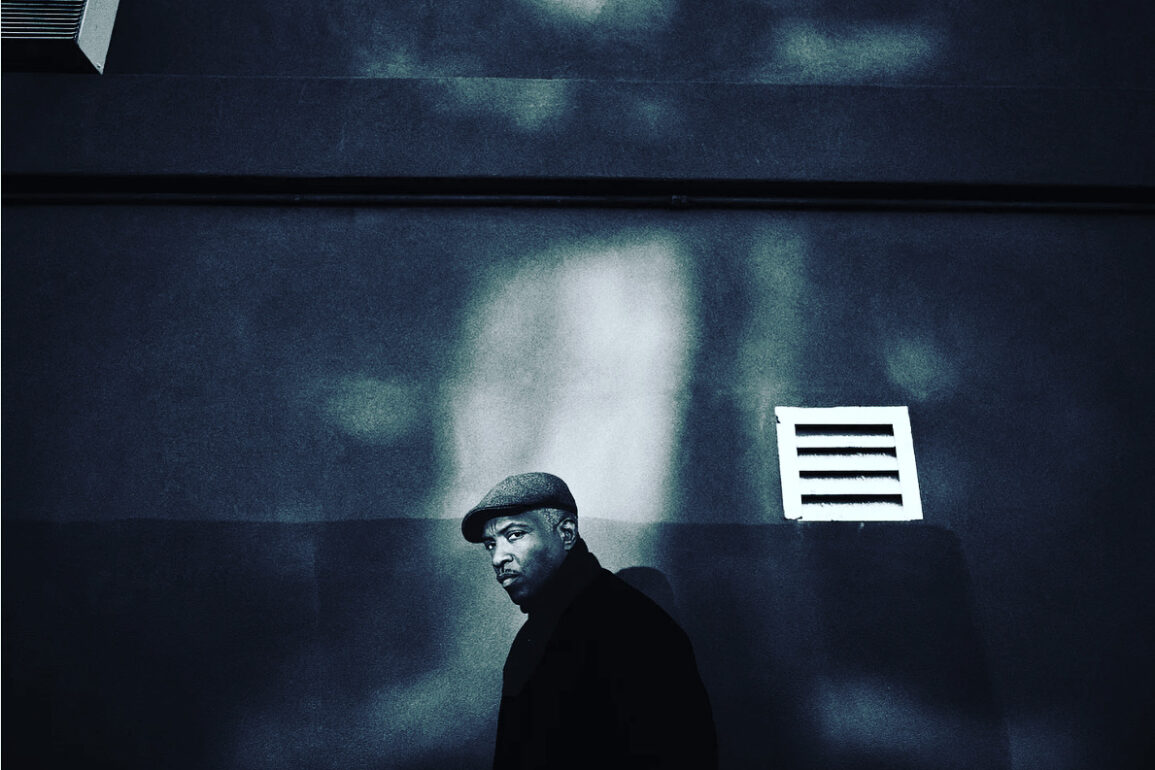Cover Photo Credit: Phil Sharp
Talking to the guy, you soon grasp that Eugene S. Robinson has an infectious laughter. When he laughs, he does not sound like a mime, but rather the person he actually is: A man who has been through a lot, whether nice or rough, and just embraces it all with passion. You can just tell he loves a good conversation and is genuine about it all.
The frontman of Oxbow, Whipping Boy, Buñuel… Robinson definitely has an impressive CV in experimental noise punk. But his title extends beyond that: A professional fighter, journalist, writer, podcaster, actor… The list goes on. So why are we here? What will we talk about when there is a universe to talk about? The centerpiece of the conversation is clear: Robinson’s new memoir, A Walk Across Dirty Water and Straight into Murderer’s Row, out October 10 via Feral House.
In just 40 minutes of Zoom time, we talk about Robinson’s youth, today, the things that make him laugh and cry, his connection to Turkey, an Oxbow concert that Björk dropped by, and more. Hope you enjoy reading it as much as we enjoyed talking it.
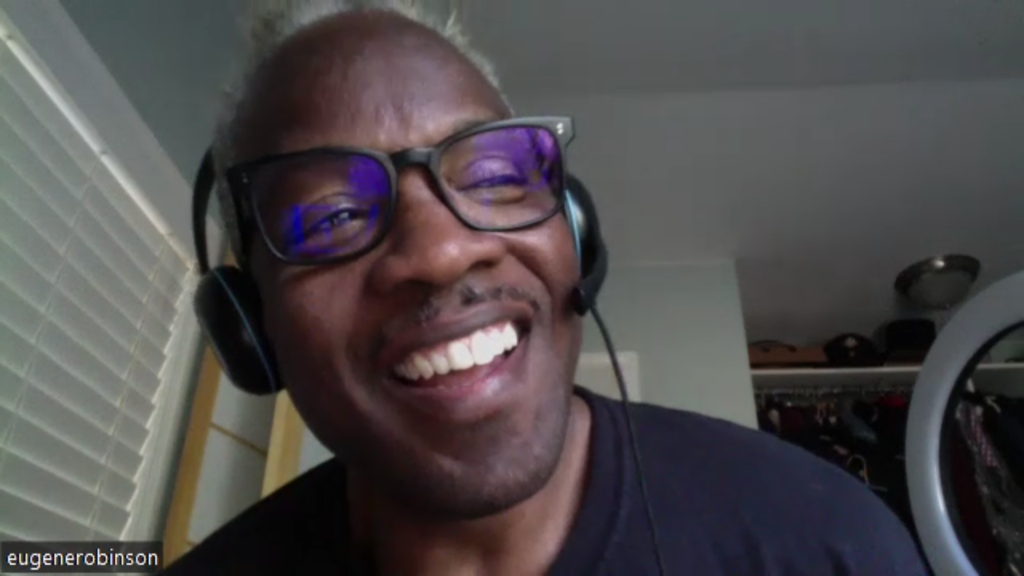
Eugene S. Robinson: I’m gonna be in Istanbul soon.
How come?
My sister lives there. Her husband is Turkish. I’m gonna visit her.
That’s cool. Have you been to Istanbul before?
Yes, I have, but I didn’t get outside the airport. It will be the first I’m gonna make it outside.
I can recommend you some places to visit.
Yeah, please! But mostly places to eat.
What type of stuff do you like to eat?
I’ll eat anything. But I really like seafood.
I’ll send you a list of places after this interview, then.
Great.
Obviously, we are here because of your upcoming memoir, A Walk Across Dirty Water and Straight into Murderer’s Row. The book includes forewords from multiple cool people, and I would like to add mine, a sloppy version at least. When I was a teenage boy like 10 years ago, Oxbow was one of the first extreme experimental bands I discovered and became a fan of. But my jaw really dropped when you followed me back on your Instagram account immediately, because I was so young, and no other person I was a fan of had done that before. So thank you for that, and also for making me happy with your songs over the years.
In a different context, I’d be arrested for that. (both laugh) Following a teenager around… I’m glad you have chosen to listen to us versus joining the other billions of people on the planet who don’t listen to Oxbow.
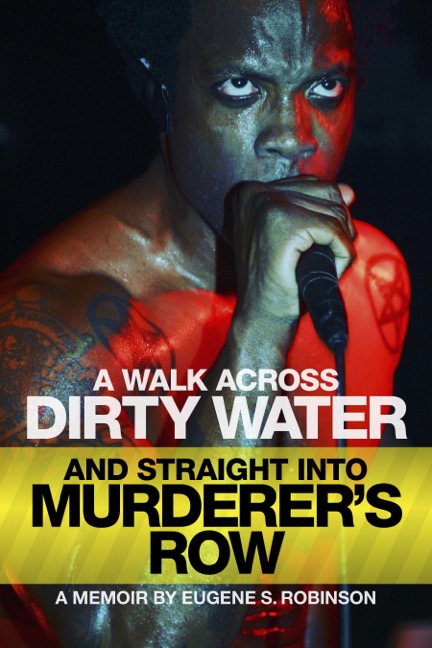
Those forewords include really nice words about you. Do you remember the first big compliment you received as a musician that touched you, or at least one of the earliest?
My first and favorite one, which I talked about in the memoir, is by Dead Kennedys’ Klaus Flouride and D.H. Peligro, RIP. It happened after a show that Whipping Boy made with Circle Jerks. We played three songs, I got off the stage, and they came up to me and said “WHO are you guys??” (laughs) That was one of my favorite moments. They could have done a million different things. They could have ignored it, said “Well, that was interesting,” and gotten back to what they were doing, but they actually came to find me and say, “Who are you?”
What did you say?
I said “We are Whipping Boy.” (laughs)
As for compliments Oxbow received, we played at this exclusive, expensive art deal at the ICA in London, and Björk came. I said “What?! That’s crazy.” Another time, we were playing South by Southwest. I look off the stage, and Thurston Moore is there. There are some photos of that moment, because I jump at the audience, go up to him, and my first words are “Why are you here?” (laughs) “I came to see Oxbow.” I thought “F.ck! This world is crazy.”
You mentioning Thurston Moore and Björk just makes me imagine possible collaborations between you and them, and the thought alone amazes me.
Yeah. If I had actually seen Björk, if someone told me she was there on time, I would just run up to her and introduce myself, immediately push for that. She had left before I put my clothes back on.
Through your other interviews, I know that you were trying to get Lou Reed and David Bowie to collaborate on different Oxbow albums. Do any further stories lie there?
Oh, man… (laughs) We reach out to these guys, and then they die! Same with Kathy Acker, she worked with us and then died. I had an interview scheduled with Dennis Hopper for The Birth of Tragedy Magazine, he agreed to it and died. I released my book Fight, and one of the back cover blurbs was supposed to be written by Norman Mailer, who died. As soon as you agree to do something with Oxbow, you are going to die. The list goes on and on. I wanted to do some stuff with John Dankworth, the film composer. I found a guy who grew up with him, he linked me up, and then a week later, Dankworth died. If you want to do collaborations with people, it is best to get them immediately. But, you know, the ones I did get are great. And they are a drop on the ocean compared to the ones that I tried to get. If you are doing stuff that is cool and I’m interested, I’ll come up and say “We should do something. It will be fun.” That’s exactly how I ended up doing a project with Jaime Stewart from Xiu Xiu. “Let’s do something fun.”
Great guy, Jaime. I interviewed him two years ago, and he was super sweet.
Yeah. He is one of the real ones.
How long did it take to compile this book, and was there much material you decided to exclude from the final version?
Well, it’s not a total life memoir, right? I’m old as a fucking hill. That was one of the things keeping me from writing a memoir before. And I didn’t wanna talk about the degenerate sexual stuff I’ve done. (laughs) If you are gonna write a memoir, you gotta tell the truth, so that is that. Also, I didn’t want my kids to hear about all the orgies I’ve done. Does my mom need to read about all my sex sh.t? They finally convinced me and said, “Look, why don’t you just write about from birth to the age of 27 when you created Oxbow? Nobody really gives a sh.t about your sex life, there is a lot of other stuff you did that you can focus on.” Then I realized what I really wanted to do was to write a memoir about my sex life. (both laugh)
Yeah, you should do a separate book on that.
Yeah. I think if this book is successful, I’m gonna write a second memoir. (laughs)
And if you are concerned about your family reading it, maybe you can write it with a cheesy alias.
Nah, no need. My mom knows everything there is to know about me, while my father and I don’t get along anyway. It’s mostly my kids, they don’t need to know about all that. (laughs) But at the same time, my kids have embraced and absorbed zero percent of what I’ve done. I think they have a vague sense of my music, maybe listened to a few songs here and there. As far as I know, they have not read any of the books. Maybe I am free to write about my penis.
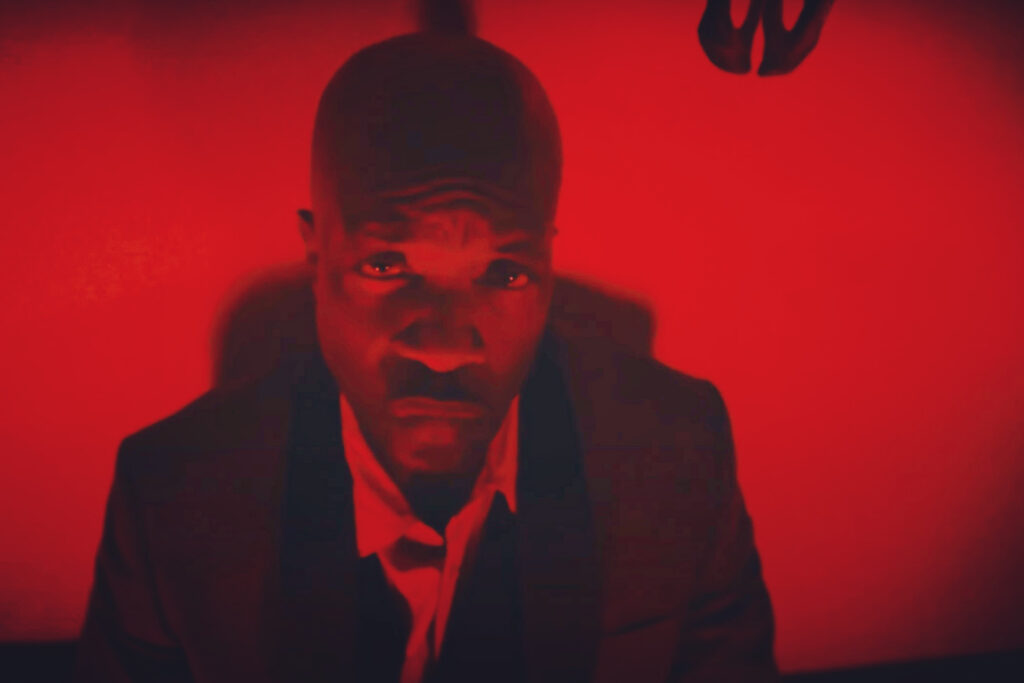
Here is one question that will test your memory: In the book, you say “1978 was a b.tch of a year.” Can you name a random crazy show with a cool story that you attended that year?
Plasmatics, over in the Meatpacking District in New York. I must have been 15, 16? Wendy O. Williams comes out with what I thought was a prop shotgun. The first time she fired it, though, I immediately knew it was not a prop. (both laugh) The music was just so loud, and over it, there was this percussive punch of an actual gun. Man, that was just nuts. And I could feel little pieces of wood on my face from where she was shooting. I was like, “This can’t be sanctioned by anybody!” That was the first time I went to a show and experienced a real sense of personal peril. That was 1978.
Do you have a copy of Teenage Depression by Eddie and Hotrods, the album that started your music journey, placed somewhere special in your room?
I have it here, it’s on my record shelf. I don’t have a special place for it, because the funny thing is, when I listen to it now, it sounds so mild. (laughs) I can’t believe it actuated an entire career in extreme music. When I listen to it now, it just sounds like rock and roll. The cover of the kid with a gun pointed to his head, though, is still very effective.
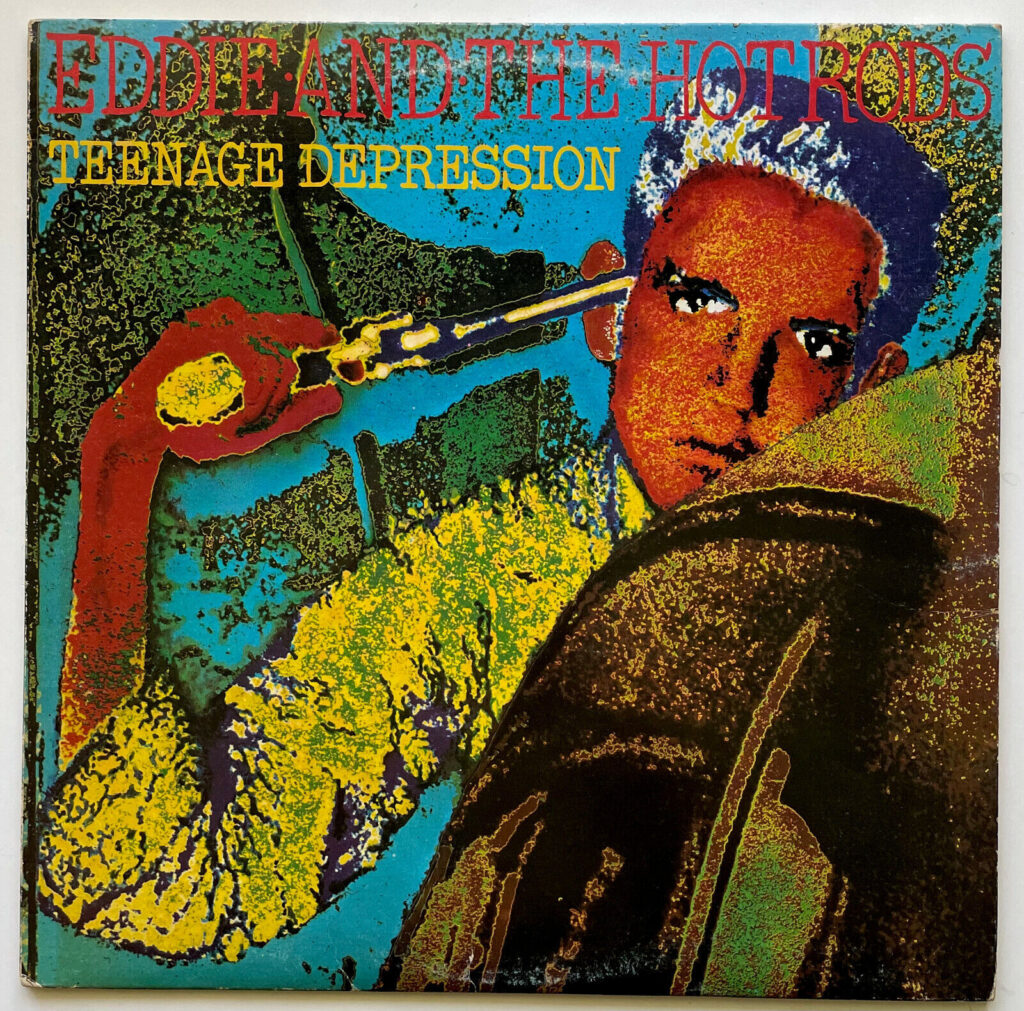
But you gotta start somewhere, right? The earliest band I became a fan of was Muse, they don’t feel that special to me now, but they kickstarted a road of music discovery.
Yeah. And it was special also because someone gave it to me, right? They have all these creation myths and stories, hero’s-journey-type arcs that someone gives the hero something and the hero goes, “What the f.ck is this?” But of course, in that instance, it changed my life. Which is crazy, I often think about it.
I call the house I am living in now “The House That Punk Rock Built.” I was looking for wood to build the house, I put a post on Facebook asking for a good place to find lumber. This woman says, “I work at a big construction company. I’ll get you the wood.” I gave her the measurements, and soon two big trucks showed up at my house. There was all this wood and I thought, “Oh sh.t, I didn’t order this!” I told her I needed it, but I didn’t think it would arrive this fast. They just dumped the wood on the driveway. The guy makes me sign something and I go, “Do you have the bill?” He just goes “Pfft.” I say, “What do you mean, Pfft?” He leaves. I go to the woman and say, “Hey, how much I owe you for this wood?” She goes, “You saved my life! I know you don’t remember this, but I was suicidal and you played a show in 1985 at Menlo Park, a house show.” I go, “Yeah, I do remember that.” “My friends who were trying to get me out of my depression decided you to play at my house party on my birthday. I was 17, and it completely changed my life. So… Thank you. No bill.”
That is a legitimately cool story.
All the fencing around my house now is built from that memory. Wood is expensive, you know. These things tell you you really touched people.
Of course, the book doesn’t only cover the finer details in life, as there are some rough real-life depictions as well. Was there a specific part of the book that turned out difficult to write?
Yeah… I didn’t really enjoy writing about some stuff. There is a line from A Clockwork Orange that goes, “This is the sad and really weepy portion of my tale.” Pretty much anything that happened non-musical between the ages 18 and 21 was an extreme f.cking drag, you know? My father disowned me, my mother disowned me… (laughs) Romantic partners were dumping me. I was stealing food to eat to live, I had no money, I was being chased by the police. It was a tough and crappy time. Writing about that after so many years didn’t give me pleasure. It’s not like I wrote my way through that section any faster because I wanted to get out of it, but still. Usually, writing is a very jolly process to me, but after writing some of that stuff I just stood up and felt dizzy. I said, “That’s just sh.tty.”
Your voice and use of vocals are pretty characteristic. And in your recent interview with The Wire, you say that voice was initially only meant to be unique to Fuck Fest. Which makes me wonder, do you ever, even jokingly, attempt a different voice, in a conventional style? During showers, maybe?
Well, it’s interesting, right? As soon as I get off the air with you, I’ll get ready to go to San Francisco. There’s a group called The Red Room Orchestra, and I am participating in a tribute to songwriter Burt Bacharach with them. The song they have given me to sing is “Walk on By”, a Bacharach tune made most famous by Dionne Warwick. However, there is another very soulful version by Isaac Hayes, 12 minutes long. I have been listening to the song, and we had a rehearsal last night and we’ll have another today. The first time, I did it just where the music hits the right place like Isaac Hayes, what you are suggesting. A voice that everybody can listen to and go, “Oh look, it’s a cover of a soul artist.” The second time was yesterday, the whole orchestra was there to rehearse it, and I used MY voice. At the end of the recording, everyone was uncomfortable, and I was like, “My work here is done!” (both laugh) There is a friend of mine who is making pornography, and at one point, one of his co-stars was crying and wanting to leave, and he says to me, “They knew what the job was when they took it!” (laughs) Anybody who was disturbed at how uncomfortable I made them, you knew what the job was when you asked me to do it! Bob Dylan once said, “I could sing better than Caruso if I wanted to, I just don’t want to.”
If I’m around the house or in the shower, I can sing anything. A song that I was singing recently was Diana Ross’ “Tell Me Where The Road Turns”. I know how the song goes, but in the shower, I just Oxbowised it. I just took this sweet song and made it creepy. (laughs) It was really wonderful. So I do both. I’m a music fan. I don’t always set out to change someone’s song, but sometimes I have to Oxbowise or Eugene-ize them.
I would love to hear those versions.
I would love to do more covers. We have only recorded two: “Spanish Castle Magic” by Jimi Hendrix, and “Girl” by the Beatles. I think there might be another one somewhere, but you have to look really long and hard for those appearing on our sets. The version of “Girl” is online because it was a live radio deal. Hearing that song feels like putting on sunglasses to me. All those dark shades of the song are all that I am hearing. So that’s what I’m singing. I wanted to do “You Don’t Know What Love Is”, but Diamanda (Galas) stole it from me. (laughs) I actually told her “I really want to do this song,” and she said, “I don’t know this!” Then she got the sheet music and told me “This is great!” Later on, she goes, “Hey, remember that song you told me about? I’m doing it.” (both laugh) “What the f.ck? You are gonna steal it from me?” She mumbles something like, “It works, you know? I’ll dedicate it to you when I do it.” She did it live and went, “This is for you, Eugene.” Sent a video to me so I could get cold comfort! Whatever.
Do you know Nick Cave’s cover of “Tower of Song” by Leonard Cohen?
No.
It’s a shrieking, The Birthday Party-esque Nick and The Bad Seeds covering a Cohen song. What you just told me about your singing style in covers reminded of that version.
Interesting. I don’t think I’ve heard it, but will definitely check it out now.
It’s a totally bonkers version, and it received praise from Cohen back in the day.
(laughs) That’s great.
A quick quiz: Do you recognize where this lyric is from?
“My how nothing changes
Different men in the same positions”
(thinks in silence)
It is Lydia Lunch, and the song is “Suicide Ocean.”
Yes! Yeah! Good for you. I was getting close to finding it. I am still a huge fan of hers. She was just here, we were sitting on my deck built by all this free wood. She was just here sitting in my backyard. That’s crazy, right?
Lydia is an artist I am also a huge fan of. If you would like to elaborate, are there any collaborative projects with her that never saw the light of the day that you would like to talk about now?
There is Baby Doll Murders, which was done for Jim Kennedy’s Thrill Killers magazine. Was supposed to be a movie or something. That never happened. There is another one where I played a psycho cop who was chased in a car across the country.
These all begin and end with funding issues. We have been seeking a forum to do something on video. Jasmine Hirst actually has a documentary-type thing coming out about depression and insanity, Lydia and I are together in that, but it’s not a movie-movie thing. She once had a show with a spoken-word piece, and I realized I would like to do some theatre thing with her. She did something like that with Emilio Cubiero, it was so long ago that I don’t really remember. I need to think of a format that makes sense. I would like to direct her in something, whether or not it would involve me in another way. There are a lot of crazy things that didn’t happen. It’s not like I’m lying, I just sometimes say stuff that doesn’t come true.
What are some of your favorite books written by musicians to recommend?
I’ve been reading a lot. I love Lydia’s Paradoxia. Harley Flanagan’s Hard-core: Life of my Own is great, which is also out via Feral House. I can count pretty much any friend of mine who has written a book about that period. I have read the book of Nancy Barile, who is married to Al from SSD, with great interest. I could also include Henry Rollins’ Get in the Van. Writing my memoir, I took a look at those not only to read about where I was and what I was doing, but also to make sure that I was writing about what everybody else had not.
Being active in different areas of creative production, do you think following your work has become a full-time job for fans?
I think what makes all these work is that they can all be observed at different paces, right? How you listen to a piece of music is different than how you read a book. And of course, I have enough books out for self-selecting. If you have zero interest in fighting, you have never read my book on it. If you have no interest in crime fiction, you have not read A Long Slow Screw. If you don’t like reading the news, then you have not subscribed to my Substack. If you don’t like videos, I have all these podcasts. There are different mediums for different people to absorb information and entertainment.
Oxbow obviously has a new album out, Love’s Holiday and I want to talk about that briefly as well. What were the two easiest and hardest songs to shape from this project?
Lyrically, “1000 Hours” was rough. Not hard to write, don’t have a problem with that, but the emotions undergirding that song were deep. For whatever reason, as I get older, it becomes harder to hold it together. (laughs) My objective in singing that was to get to the end of it without sobbing, which seems like an easy thing to do. Crying is something you have to be in practice for, and I wasn’t practiced. I have spent large portions of my life with horrible things happening, and I just went, “Meh, okay.” What surprised me was that after a certain point, I was sobbing at things that don’t typically make you unhappy. “Oh, somebody stabbed me! That hurts, but I’m not gonna scream, I’m gonna cry! Ah!” That doesn’t make sense. Meditations on finitude will plunge you into a deep depression. Next thing you know, you stand in your front yard with tears on your face. (laughs) “Man, what happened? How did I become this person?” It required a lot of discipline, balance, and focus for me to get through that song. Nobody cares if I’m crying, whatever, just record the f.cking song! That’s the only one that stands out in my mind, I can’t name an easy one.
When you check out your streaming platform’s search history, what are the last 3 things that pop up?
Cool one. (laughs) I listened to “Walk on By”, Isaac Hayes’ version, for reasons I mentioned earlier.
I listened to B.G.’s Chopper City in the Ghetto, which was maybe best known for the big hit “Bling Bling.” But of course, the record had a lot of other cool things. I loved “Intro”, where there is just him and this other guy talking. It’s just so celebratory. At some point he goes, “Make the dome ya home if ya can afford it.” I took that as an analog for much larger life issues. Take as much as you can embrace, but want what you take. I like that as a life advice.
I also listened to a song by the band Horse.
If you had a memorial stone at a Musicians Theme Park 100 years from now, which one of your lyrics would be written on it?
That’s easy: “And while they say that the best things in life are free, everything around here comes with a fee.” (laughs)
I did not expect you to come up with an answer instantly. I’m really impressed.
That lyric is so good I can not believe I actually wrote it. It came to me with just the perfect timing, and I’m paying for a lot.
Robinson’s new memoir, A Walk Across Dirty Water and Straight into Murderer’s Row, is out October 10 via Feral House.

